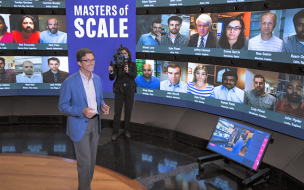Educational technology companies Coursera, Udemy and Alison are all disrupting the buoyant corporate training market, worth $70 billion in the US alone, according to Deloitte research.
As technology improves and online learning gains credibility, they are signing up big businesses including AT&T, Accenture and Microsoft.
To counter the threat, many business schools are creating a portfolio of custom online courses that corporations pay for to supplement their traditional campus exec programs. Columbia, Harvard and Wharton have all moved in this direction.
Nancy Moss, director of communications at edX, a non-profit Mooc platform founded by Harvard and MIT that has been funded with $90 million, says the group is expanding into new directions: “Many of our learners who enrolled in a verified certificate are employed or [are] looking for new employment.”
EdX this month struck a deal with Microsoft to offer IT development courses, and has an agreement with the International Monetary Fund to offer courses in macroeconomics and finance to governments.
Steve Guggenheimer, corporate VP of developer experience at Microsoft, says the tie-up will provide new opportunities for students to create innovative services that have a meaningful impact on today’s “mobile and cloud-centric world”.
Such announcements are now common. FutureLearn, a Mooc platform funded by distance learning specialist the Open University, recently developed courses in contract management and commercial relationships with the UK government, an industry body and the University of Southampton.
Violet Okpere, group discipline excellence manager at energy major Shell, says the FutureLearn course will help people to address issues in their own sector.
She adds: “A Mooc enables people to think widely and broadly about the issues from a global perspective.”
Business is warming to the online training market. MC McBain, VP for global business development at IBM, says: “What’s very energizing about the Mooc is the number of people you can reach around the world. With mobile technology, everyone has the ability to expand their knowledge and increase their skills.”
Coursera, a Mooc provider with 12 million users that has raised $85 million in funding, has partnered with tech companies including Instagram and Snapdeal to expand its range of fee-paying business courses. It provides Verified Certificates as proof of course competition, and also industry placements.
Julia Stiglitz, head of business development at Coursera, says that several companies have joined up with its partner universities.
“Beyond being a revenue-driver, Verified Certificates also provide learners with a shareable asset that validates their achievement of a obtaining a high-demand skill,” she says.
Udacity, an online learning platform that had amassed 1.6 million users last year, runs a business unit that works with Google, Facebook and Capital One, the financial services group.
It has launched a series of “nanodegree” programs – courses offered when a corporate partner builds and recognizes specific courses geared toward employment at their company.
Telecoms giant AT&T was the first to offer such a degree. It paid Udacity $3 million to develop a series of courses.
Scott Smith, senior VP of human resources operations at AT&T, says: “Earning this credential will soon become a key part of AT&T’s training and talent acquisition model.”
Udemy launched a business service two years ago and has since grown to have more than 350 partners including Oracle, the computer technology group, and usually licenses content for $29 per user per month.
International business school INSEAD recently launched a new web and mobile-based solution that beams high-quality video lectures from INSEAD experts to companies’ devices. It has already signed up both Accenture and Microsoft.
Bruno Berthon, managing director of Accenture Strategy, says the online offering will be incorporated as a platform for all of the group’s consultants.
“It combines top business education with the agility that technology enables,” he says, developed at “scale and speed”.
Julia at Coursera points out that some of the most coveted skills in the job market today didn’t exist 10 years ago – meaning workers are learning new skills long after they graduate from university.
“Flexible, online learning makes it possible for professionals to try new fields and update their skills throughout their careers,” she says.
Mike Feerick, CEO and founder of Mooc provider Alison, says he realized many years ago that the number of hours students spent learning content while in higher education was a fraction of that required within the workplace.
“Our initial and continued focus is skills for the workplace. The market simply has to go this way,” he says.
Corporate training – executive education – is the most obvious target of disruption but it won’t be the last segment of business education that is targeted.
Mike is critical of business education as a whole – an industry that is under increasing pressure to update both its content and methods of delivery.
He says: “Business education providers are becoming unnecessary middlemen – soon to be squeezed out except where the learning is time-sensitive and new, or that the knowledge is exceptionally high-level.”
RECAPTHA :
43
a9
bd
b5








